COVID 19: Society’s Great Moral Divide
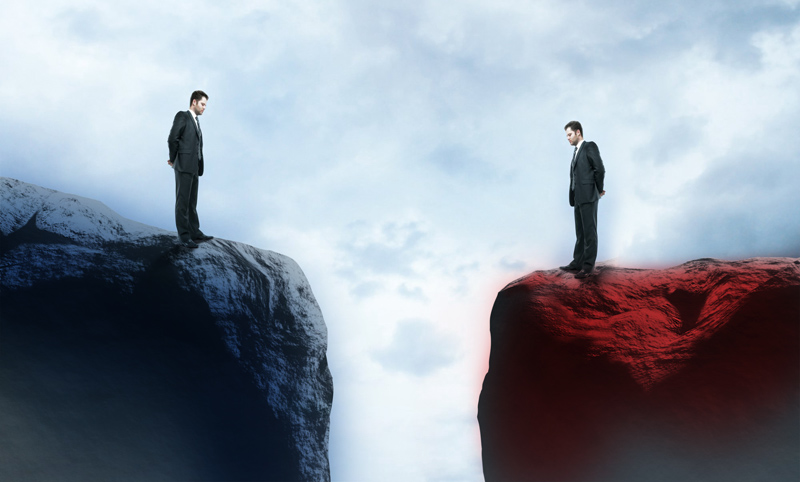
The Issue
A major societal divide has emerged in North American communities around the impact of COVID on personal freedoms. On the one hand, there are people passionate about the primacy of promoting their personal rights and freedoms. On the other hand, there are others who champion collective responsibility—social distancing, wearing masks, limits on gatherings or massing by individuals—all for the safety of the common good.
This blog raises two questions about this divide or dichotomy. First, is one or another position more responsible (short or long term) as a means to combat COVID 19—mother nature’s hellacious spawn? Second, what are the stakes for public health—in terms of things like acceptance of vaccines, protection of civil rights, snitch culture, and increase in the ratio of infected to recovery patients?
The Great Divide
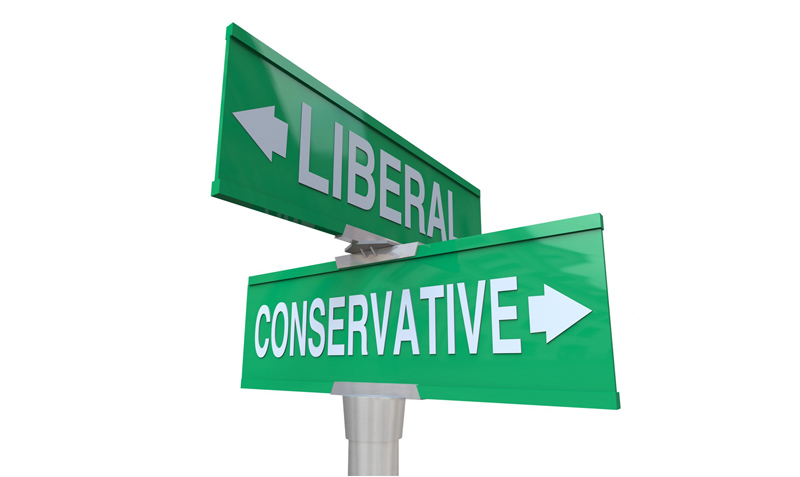
Jonathan Haidt writes in his book, the Righteous Mind, of a bifurcation of values in western culture, primarily in the United States, between conservatives and liberals. The two camps have certain values in common but, in other matters where they differ, those values are diametrically opposed. From conducting over 300,000 surveys, he and his collaborators have considerable empirical evidence that members of the two “divides” simply can neither understand nor accept the other’s values.
As the divide applies to COVID-19, here in simplified terms are the two opposed positions:
| Variable | Personal Freedom | Collective Consciousness |
| Ideology | Libertarian | Collectivist |
| Personal health | Right of the individual | Responsibility of the individual to the collective |
| National motto | Life, liberty and the pursuit of happiness (United States) | Peace, order and good government (Canada) |
| Role of government | Minimal | Social safety net |
| Restrictions on freedom of assembly | Contrary to freedom of religion and the person | Fundamental to flatten the curve (available ICU beds) |
| Stay at home orders | Constitutional so long as narrowly applied to control spread of the virus | Aggressively apply restrictions wherever medically warranted |
| Closing college and university dorms | Violates civil liberties of students who are indigent, live in abusive home relationships, or are homeless immigrants | Use due process regulations to protect health and safety when necessary |
| Private enterprise | Right of owners and patrons to largely set their own business practices | Right of authorities to order all stores and non-essential businesses to close down |
| Free speech | Aggressive promotion of individual rights | Stricter limitation on hate speech |
| Freedom of religion | God will protect His flock | Restrictions where necessary |
| Social gatherings | Freedom to party | Size of gathering restrictions |
Not all Canadians are collectivists, nor are all Americans champions of individualism. That being said, the two nations have developed government practices, case law, health systems and cultural norms that are different and reinforce the stereotype.
Conservatives see the pandemic as having the following consequences:
- Destruction or erosion of democratic states and liberties
- Threaten increased surveillance powers, control over information, delayed elections, and suspension of rights
- Warrantless searches and arrests are an arrow through the heart of a democratic society.
Liberals see responsibility in addressing the pandemic in the following ways:
- With coronavirus, your freedom stops when it endangers others by facilitating transmission of a highly communicable and dangerous disease
- Society has the right to override certain personal freedoms to protect public health and safety
- Governments may err on the side of excessive repressing groups (War Measures Act, internment of Japanese Canadians in WWII) in times of national emergencies
Ethical and Legal Dimensions
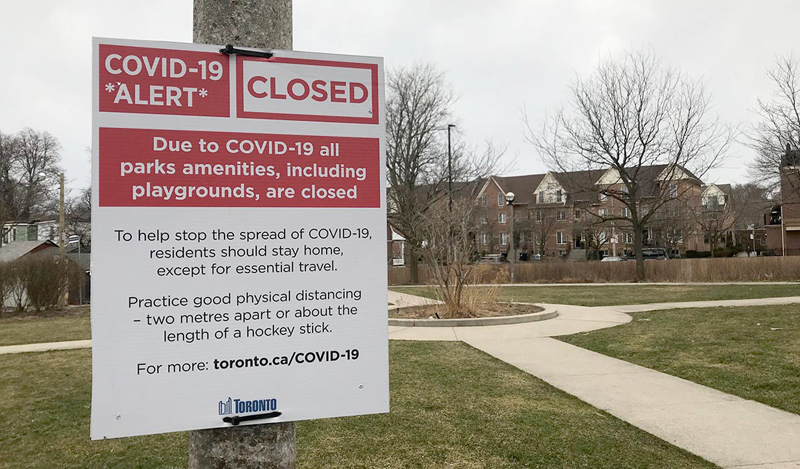
Agreeing to give up civil liberties like playing in parks, eating in restaurants, reading in libraries, visiting family members in hospitals and nursing homes, and travelling to other places has become a point of Canadian civic pride. Giving up freedoms is the currency of good will in a pandemic, on the common understanding that these restrictions can limit coronavirus. Now, six months after the first of what has become a succession of these measures, some parts of the public are more visibly balking at ready acceptance of the specifics of government edicts and rules. This throws into question government’s moral and legal social licence to regulate.
To some people, this routine compliance to restrictions on personal and collective liberties never matters. Some citizens thrill to these new public orders in a spirit of can-do collaborative optimism. Others check up on everyone else in hopes of snitching, which some governments have cautiously enabled with hotlines and enforcement police, as noted in EthicScan blog article, Becoming a Snitching Culture (May 7). Still others are clueless or know very well what is going on, but resist even the slightest deviation from their normal routines and practices.
International human rights law, notably the International Covenant on Civil and Political Rights (ICCPR), requires that restrictions on rights for reasons of public health or national emergency be lawful, necessary, and proportionate. Restrictions such as mandatory quarantine or isolation of symptomatic people must, at a minimum, be carried out in accordance with the law. They must be strictly necessary to achieve a legitimate objective, based on scientific evidence, proportionate to achieve that objective, neither arbitrary nor discriminatory in application, of limited duration, respectful of human dignity, and subject to review.
In Canada, both sides in this debate could potentially rely on the Charter to bolster their position. The Charter should not hamstring unprecedented government measures that are designed to tackle an unprecedented crisis, as long as such measures can be justified. What the Charter mandates is proportionality and balance. Particular care needs to be taken not to worsen the already precarious situation of our homeless, prisoners, those seeking refugee status, sex workers, drug addicts and other vulnerable and marginalized communities. What some legal experts fear is a government invoking the “Notwithstanding clause” in section 33 of the Charter. That would mean that there are no restrictions on those governments that decide to enact laws that abolish our legal rights and fundamental freedoms. That kind of action would give the COVID-19 virus the power not only to cause havoc but also infect the Rule of Law.
There have been very few Supreme Court cases involving the U.S. government’s power to deal with the spread of communicable diseases. The most relevant decision for today was issued in Jacobson vs. Massachusetts in 1905. In that case, the Supreme Court upheld the constitutionality of a state law requiring compulsory vaccinations against smallpox. The court declared, “Upon the principle of self-defence, of paramount necessity, a community has the right to protect itself against an epidemic of disease which threatens the safety of its members.” The court explicitly rejected the claim that “liberty” under the Constitution includes the right of individuals to make decisions about their own health in instances where those decisions could endanger others. But the court also made clear that restrictions imposed by the government to control communicable diseases must have a “real or substantial relation” to protecting public health. Under this standard, there is no doubt that quarantine, “shelter in place,” and closure requirements are constitutional as a way of stopping the spread of COVID-19, even though they restrict freedom.
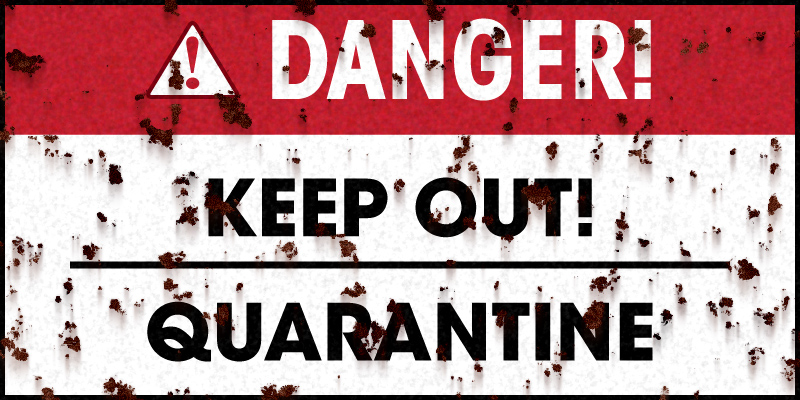
Throughout American history, quarantine orders have been upheld as valid exercises of the police power possessed by state and local governments. Not long after the Revolutionary War, Philadelphia imposed a quarantine to stop the spread of yellow fever. In 1799, Congress, by statute, recognized the power of states to impose quarantines. In 1926, the Supreme Court ruled that “a state, in the exercise of its police power, may establish quarantines against human beings, or animals, or plants.” Most recently, in 2016, a federal district court in New Jersey upheld a quarantine order for a nurse who had returned from Africa after treating Ebola patients.
The power to quarantine is not unlimited, however, and courts should invalidate orders that do not have a “real and substantial” relation to public health. In 1900, for example, a U.S. federal district court declared unconstitutional a quarantine order in San Francisco to stop the spread of bubonic plague because it was “clear that it is made to operate against the Chinese population only” and was based on racism, not public health needs.
Government Responsibilities and Ethical Threats:
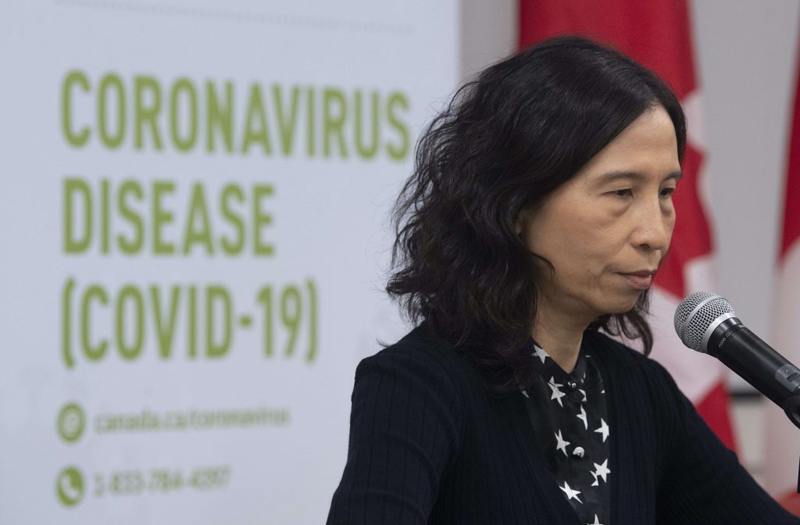
The coronavirus pandemic has certainly cast an unflattering light on many of society’s vulnerabilities including:
- (a) the federal government’s slow initial reaction to the pandemic;
- (b) the lack of sharing of information across provincial boundaries;
- (c) the widespread systemic care issues at long-term care facilities; and
- (d) the uneven health outcomes due to socioeconomic and racial realities.
In ethical terms, more attention is being focused on debating government’s proper responsibilities and the major longer term ethical battlegrounds:
1. Increased Surveillance: Government has a legitimate need to make sure that contagious people are following quarantine rules. However, this need can easily be used to justify an ever-expanding surveillance state that might not be dismantled once the crisis has subsided. In China, citizens of hundreds of cities have been required to install tracking software on their smartphones. The software shares location data with the police. In Israel, the police are allowed to use cellphone data to track the locations of those suspected of being infected. No court order is required. In Poland, the government is using facial recognition technology to track people’s movements.
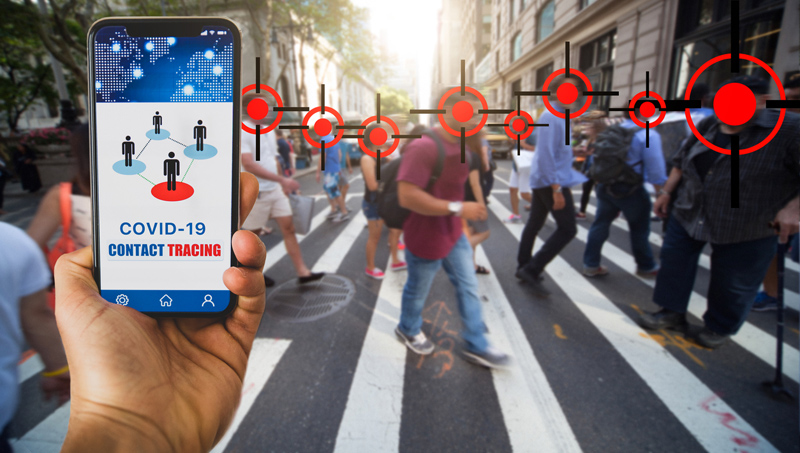
2. Suspension of Democratic Rights: Numerous countries have suspended fundamental democratic rights such as freedom of assembly, freedom of movement and protections against warrantless searches and arrests. While there are obvious reasons for limiting gatherings during this crisis, that does not justify their wholesale suspension. Stay at home orders issued because they are narrowly tailored to further the compelling governmental interest in controlling the spread of the virus are a far cry from suspending the right to association altogether.
3. Control of Information: Numerous countries have made it illegal for the media or individuals to publicize information about the coronavirus without government pre-clearance. For example, the Indian state of Maharashtra, with a population of 114 million people, has put such a restriction in place. In Thailand, journalists can face up to five years in prison for failing to correct what the government deems to be incorrect information about the coronavirus. Similarly, in Hungary, journalists and others face up to five years imprisonment for “distorting” information about the disease. China, Iran, Jordan, Egypt and Thailand have notoriously supressed freedom of information, the press, and whistle-blowing, whereas countries supporting transparency include Taiwan, Singapore and South Korea.
4. Vaccination: There will be a major battle on voluntarism versus compulsion when a vaccine is developed and made available in sufficient quantities. The history of parens patriae (parent of the nation) authority that the state has in the U.S. dates back to 1905 and the U.S Supreme Court’s ruling in Jacobson v. Massachusetts. It’s a case where an individual refused to be vaccinated in his local community, and the case went to the Supreme Court. The Supreme Court, in ruling against this individual, said that it is within the state’s authority to protect the health and safety of the community. This ruling further undergirds the state’s authority with regard to protecting health and safety and imposing certain conditions on individuals in order to do so.
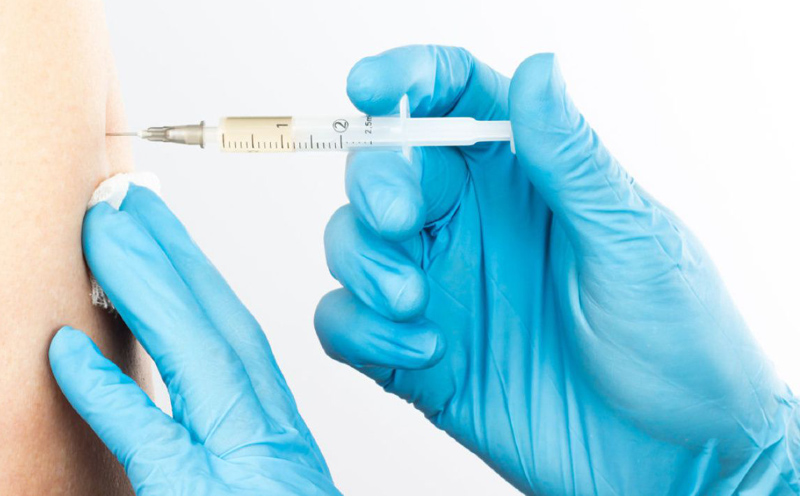
5. Trust in Government: We are witnessing an ever-changing patchwork of COVID rules determined by public authorities in meetings held behind closed doors. We don’t see a coherent and consensus action plan coming from the federal government in full and open parliamentary debate. There are growing dissident groups holding confrontational rallies. This mishmash
- (a) undermines the confidence that individuals have in government;
- (b) promotes different protocols, reporting definitions, tracing and tracking systems, and treatment models between provinces and states in terms of how to handle a health crisis such as this; and
- (c) reinforces (often erroneous) stereotypes about which class or race of people are responsible for transmission of the virus.
6. Health Status Privacy Rights: Health data is particularly sensitive, and the publication of information online can pose a significant risk to affected persons and in particular people who are already in positions of vulnerability or marginalization in society. Rights-based legal safeguards will need to be developed to govern the appropriate use and handling of personal health data.
7. Restrictions on Freedom of Movement: Governments, such as those in South Korea, Hong Kong, Taiwan, and Singapore have responded to the outbreak without enacting sweeping restrictions on personal liberty, but have reduced the number of travelers from other countries with significant outbreaks. Governments have broad authority under international law to ban visitors and migrants from other countries. However, domestic and international travel bans historically have often had limited effectiveness in preventing transmission, and may in fact accelerate disease spread if people flee from quarantine zones prior to their imposition. Travel bans and restrictions on freedom of movement should not be discriminatory nor have the effect of denying people the right to seek asylum or of violating the absolute ban on being returned to where they face persecution or torture.
Conclusion:
In a pandemic, poor decision-making can result not only in bodies literally on the ground but also greater exposure of lethal risks and vulnerabilities– personal, corporate, and government. There is little evidence that the individual-collectivist “divide” will be settled amicably in a way that accelerates solutions to treating the coronavirus. Indeed the crisis of business’s social licence to operate in the first decade of this century is being mirrored today in a parallel debate about government’s responsibilities in dealing with the virus. Major stakeholders like citizens, elected officials, essential workers, and policymakers are finding it necessary to turn more necessary attention to how best to respond to the second wave that’s coming, and other waves that will follow that.
Further Reading:
Jonathan Haidt, The Righteous Mind
Forbes – How The COVID-19 Crisis Is Threatening Freedom And Democracy Across The Globe:
https://www.forbes.com/sites/evangerstmann/2020/04/12/how-the-covid-19-crisis-is-threatening-freedom-and-democracy-across-the-globe/#52df79a04f16
Slate – Coronavirus Civil Liberties:
https://slate.com/news-and-politics/2020/03/coronavirus-civil-liberties.html
Human Rights Watch – Human Rights Dimensions of COVID-19 Response:
https://www.hrw.org/news/2020/03/19/human-rights-dimensions-covid-19-response
The Atlantic – Red and Blue America Agree That Now Is the Time to Violate the Constitution:
https://www.theatlantic.com/ideas/archive/2020/03/coronavirus-america-constitution/608665/
Los Angeles Times – Op-Ed: Yes, the government can restrict your liberty to protect public health:
https://www.latimes.com/opinion/story/2020-04-20/government-can-restrict-your-liberty-to-protect-public-health-courts-have-made-that-clear
The International Center for Not for Profit Law:
The Covid-19 Civic Freedom Tracker
The National Post – It’s not just civil liberties. Many other charter rights have been violated in COVID-19 pandemic:
https://nationalpost.com/news/its-not-just-civil-liberties-many-other-charter-rights-have-been-violated-in-covid-19-pandemic
Ottawa Citizen – COVID-19 shines an unflattering light on many of Canada’s vulnerabilities:
https://ottawacitizen.com/news/local-news/covid-19-shines-an-unflattering-light-on-many-of-canadas-vulnerabilities
University of Ottawa: Vulnerable: The Law, Policy and Ethics of COVID-19.
- Ethical Risk: Restaurant and Food Service Safety - January 15, 2021
- Ethical Risk: COVID Aviation Refund Controversy - January 13, 2021
- Ethical Risk: Transit Safety in COVID Times - January 11, 2021
